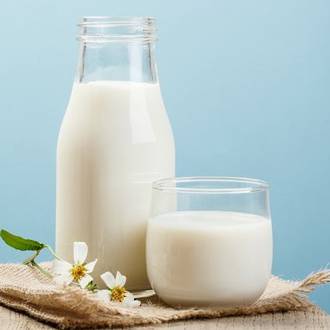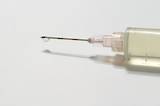Shop
02168
https://www.under5s.co.nz/shop/Hot+Topics+Articles/Food+%26+Eating/Introducing+goats+milk+to+babies+and+toddlers.html
Introducing goat’s milk to babies & toddlers
|
In New Zealand cow’s milk is recommended as part of a child’s daily diet from one year’s old due to the calcium, vitamin D and fat content. Increasingly though parents are looking for alternative options. One option is goat’s milk. Find out about the benefits of goat’s milk, goat’s milk formula and things to consider before introducing goat’s milk to your little one’s diet.
|
You might also be interested in ...
Immunising kids in New Zealand
The topic of immunisation for kids often throws up lots of discussion and strong view points, but remember the choice to immunise your children is yours to make.
Removing plasters from kids skin
No-one likes having plasters removed from their skin, not even adults! This simple and effective method will help remove plasters quickly and easily, and with minimal pain from your kids skin.
join usJoin us on social media for all our latest news. |
sign upSign up and receive our latest newsletters. |
|







Increasingly though parents are looking for alternative options. One option that’s growing in popularity is goat’s milk.
Goat’s milk is often the preferred choice for babies and toddlers after breast milk in many other countries. It’s also easier to digest and less allergenic than cow’s milk.
Introducing goat’s milk to babies & toddlers
Find out about some of the benefits of goat’s milk, goat’s milk formula and things to consider before introducing goat’s milk to your baby's or toddler's diet.
Benefits of goat’s milk
Some of the benefits of goat’s milk include:
1. Less allergenic protein than cow’s milk
Goat's milk contains only trace amounts of the allergenic protein alpha-S1 casein that’s found in cow's milk.
This protein that triggers allergies in cow’s milk is almost non-existent in goat’s milk, which means that a baby or toddler who might not be able to tolerate cow’s milk is more likely to be able to tolerate goat’s milk with no side effects.
However, goat's milk and cow's milk both contain another type of allergenic protein, beta-lactoglobulin, which is why some babies or toddlers who are allergic to cow's milk may also be allergic to goat's milk.
2. More digestible protein than cow’s milk
When babies and toddlers drink milk of any kind, protein clumps or curds are formed in their stomach by the action of the stomach acid on the protein.
The softer and smaller the curds (protein clumps), the more digestible they are and quicker they will pass through the stomach.
Goat’s milk protein forms small and very soft curds compared to cow’s milk which makes it easier to digest and in turn leads to fewer digestion problems.
This can be an advantage for babies and toddlers who spit up a lot or who have gastroesophageal reflux (GER).
3. More digestible fats than cow’s milk
When it comes to digesting fat in milk, it all comes down to the type of fatty-acid chains that are found in it.
For instance, the fat globules in goat's milk are easier to digest because they contain a higher proportion of short and medium-chain fatty acids.
Milk with longer fatty acid chains, like those found in cow’s milk, require more work for the intestines to digest and in turn take longer to get through the digestive system.
4. Slightly less lactose than cow’s milk
While both cow's milk and goat's milk contain the sugar lactose, goat's milk contains slightly less. It's possible that this is a slight advantage for babies and toddlers who are lactose intolerant.
However, keep in mind that both goat’s milk and cow’s milk do contain lactose, so babies and toddlers with severe lactose intolerance may not be capable to handle either type of milk.
Goat’s milk formula
We know that breast is best when it comes to the ideal milk for babies, but when this is no longer possible goat’s milk formula may suit some babies better than traditional cow’s milk-based formulas.
Also babies under 12 months who are allergic to cow's milk-based formulas, soy formulas or hypoallergenic formulas are sometimes put on goat's milk formula, but only with consultation from the baby's doctor or a pediatric nutritionist.
There are a variety of formulas on the market with goat’s milk as a main ingredient. They generally have all the required vitamins and minerals added and have been adjusted to further support the natural digestibility of goat’s milk.
However depending on the formula recipe, it’s possible that you might need to supplement your little one’s diet with folic acid, Vitamin B-12 and possibly iron to ensure they are receiving the right balance of nutrients at every meal.
Look for formulas that are hypoallergenic if possible, to cut down on the risk of allergies. You should also look for formulas or regular goat’s milk which is certified to be organic and free of antibiotics, is not genetically modified or has growth hormones or other potential risks.
Make sure the goat’s milk is pasteurized too to destroy harmful bacteria that could make your baby sick.
Things to consider before introducing goat’s milk
1. Your child’s age
Generally, the use of goat's milk or cow's milk products in children under one year’s old is not recommended because they can cause intestinal irritation and anemia.
2. Folic acid
Keep in mind that the nutrient composition of cow’s milk and goat’s milk is different.
Goat’s milk contains less than 10 percent of the folic acid found in cow’s milk, which means your baby or toddler will need a supplement of folic acid to stay healthy.
3. Allergies
What if your baby or toddler develops an allergy to goat’s milk? The allergy will usually show up immediately, but it might take many different forms.
The most common symptoms include wheezing, runny nose, sneezing, swelling and vomiting. Your baby or toddler might also develop eczema and a skin irritation.
More serious issues that signal an allergy include asthma, diarrhoea, coughing, nasal congestion, itchy rashes, watery eyes, cramps, and colic in small babies.
If your baby or toddler develops any of these symptoms, stop the goat’s milk to see if the symptoms go away and speak to your doctor about other milk options.
However, if they have a life-threatening reaction, including trouble breathing, seizures or other signs of anaphylaxis, stop the goat's milk immediately and call for an ambulance.
4. Vitamins and minerals
The vitamin and mineral content of goat's milk and cow's milk are fairly similar, though goat's milk contains slightly more calcium, vitamin B6, vitamin A, potassium, niacin, copper and the antioxidant selenium.
On the other hand, cow's milk contains more vitamin B12 and much more folic acid.
Since goat's milk contains less than ten percent of the amount of folic acid contained in cow's milk, it must be supplemented with folic acid.
More kids food articles to enjoy:
- Cows milk allergy
- 7 ways to spot food intolerance
- Are kids yoghurts doing more harm than good
Image source: nuffoodsspectrum